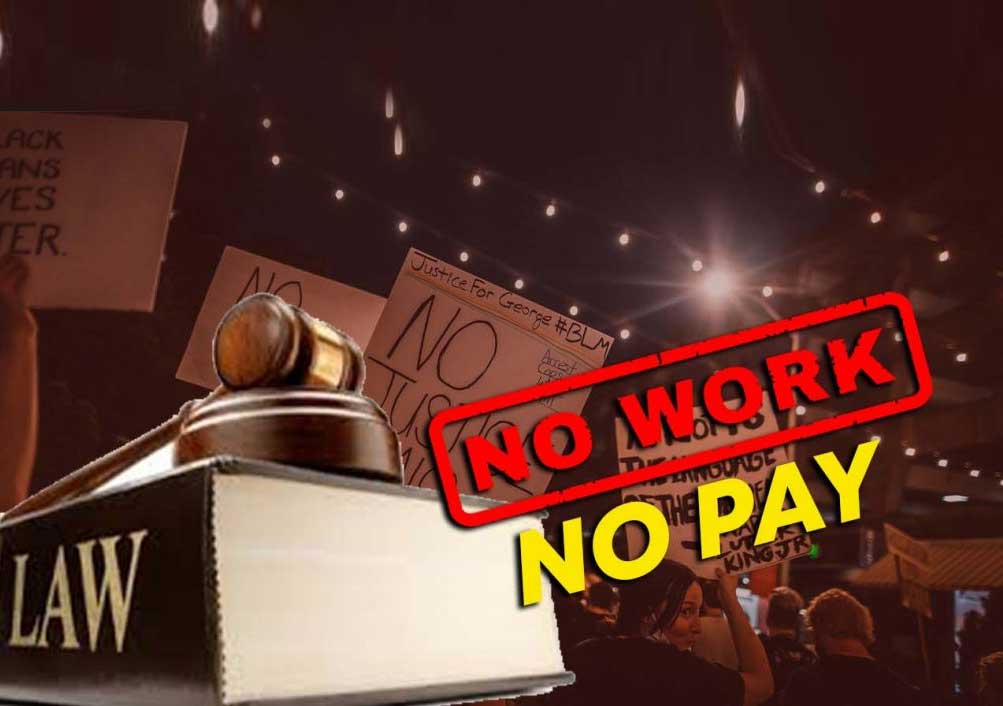In LPA 762/2019-DEL HC- Principle of ‘no work, no pay’ cannot be applied where employee was illegally kept out: Delhi High Court Justices Rajiv Shakdher & Sanjeev Narula [08-04-2022]

Read Order: M.K. SAINI Vs. INDRAPRASTHA POWER GENERATION COMPANY LTD & ORS
Mansimran Kaur
New Delhi, April 12, 2022: Dismissing a review petition on the ground that no fundamental error apparent on the face of record was disclosed, the Delhi High Court has affirmed the view that the principle of ‘no work, no pay’ cannot be applied where an employee was illegally kept out.
The Division Bench of Justice Rajiv Shakdher and Justice Sanjeev Narula was dealing with a review petition filed by Indraprastha Power Generation Company Ltd. (IPGCL) seeking review of the judgment dated February 22, 2021, whereby IPGCL was directed to pay the Appellant – Shri M.K. Saini emoluments from February 1, 2013 to May 8, 2014 (excluding allowances payable on actuals or in lieu of services rendered).
Brief facts relating to the present review petition was that by an order dated September 3, 2021, IPGCL was directed to apprise the Court of the salary that was paid to the appellant and also to state the period of the same. Consequently, IPGCL filed an affidavit dated October 25, 2021.
The counsel for the respondent raised certain objections pertaining to the impugned order. It was submitted that the Court erred in observing that the IPGCL disputed over the fact that the appellant was not employed with IPGCL. It was further submitted that the employment of the appellant was never the question, neither in the affidavit filed nor the same fact was contended before the Court. IPGCL contended that for the period in question, the Appellant did not work at his new place of posting i.e. the Safety Department, (PPS-III) Bawana, Pragati Power Corporation Ltd. (PPCL), despite several directions issued to him.
It was further contended that the appellant was not entitled to receive the emoluments in accordance with the “no pay , no work” principle for the period in question – as he did not report at his new posting with PPCL. It was further added that the Court’s finding that the principle of “no pay, no work” would not apply in the present case was certainly an erroneous observation.Thus, by making the above contentions, the respondent instituted the review petition against the impugned judgment for the reason that it was prima facie erroneous.
This Court considered the contentions and noted that it was an undisputed fact that on October 23, 2012, the appellant was transferred from IPGCL to PPCL. The said order was quashed by this Court on April 7, 2015. The Co-ordinate Bench, taking note of the quashing of such transfer order, held that the effect of quashing meant that it was a nullity from its inception. It was in such circumstances that the Court had held that the principle of no work, no pay would have no application.
It was observed in the impugned order that once there was nothing to show that IPGCL, in spite of the order of transfer of the appellant to PPCL, called upon the appellant, at any time during February 1, 2013 to May 8, 2014, to join back duty of IPGCL, the principle of no work, no pay could not be invoked. The appellant could not have rendered any work for the respondents IPGCL during the said period, owing to the respondents IPGCL having transferred the appellant to PPCL and which transfer was ultimately quashed vide judgment. It was also noticed therein that irrespective of controversy with respect to the medical leave of the appellant, once there was nothing to show that the appellant was given an opportunity to work and did not work, the principle of no work, no pay cannot be invoked.
The Bench noticed that the appellant was seeking for the release of the salary for the period of his employment at IPGCL and not with PPCL. Subsequently, the respondent’s affidavit was taken into consideration and it was expected that the respondent would defend its own actions, however the respondent refused the emoluments of the appellant on the ground that he did report at his posting with PPCL. This contention had no rational basis, as the transfer order was declared void by the above stated order of this Court, therefore the respondent could not deprive the appellant of his emoluments by stating that he did not work with PPCL.
The Division Bench asserted, “Nevertheless, the transfer order has been held to be a nullity, and thus, IPGCL cannot be permitted to argue that since the Appellant did not do any work for PPCL, no emoluments are payable. As already observed in the impugned order, the principle of no work, no pay cannot be applied where an employee was illegally kept out.”
As the review petition failed to prove that any erroneous observation was made in the impugned judgment, the Division Bench dismissed the petition as being meritless.
Sign up for our weekly newsletter to stay up to date on our product, events featured blog, special offer and all of the exciting things that take place here at Legitquest.




Add a Comment